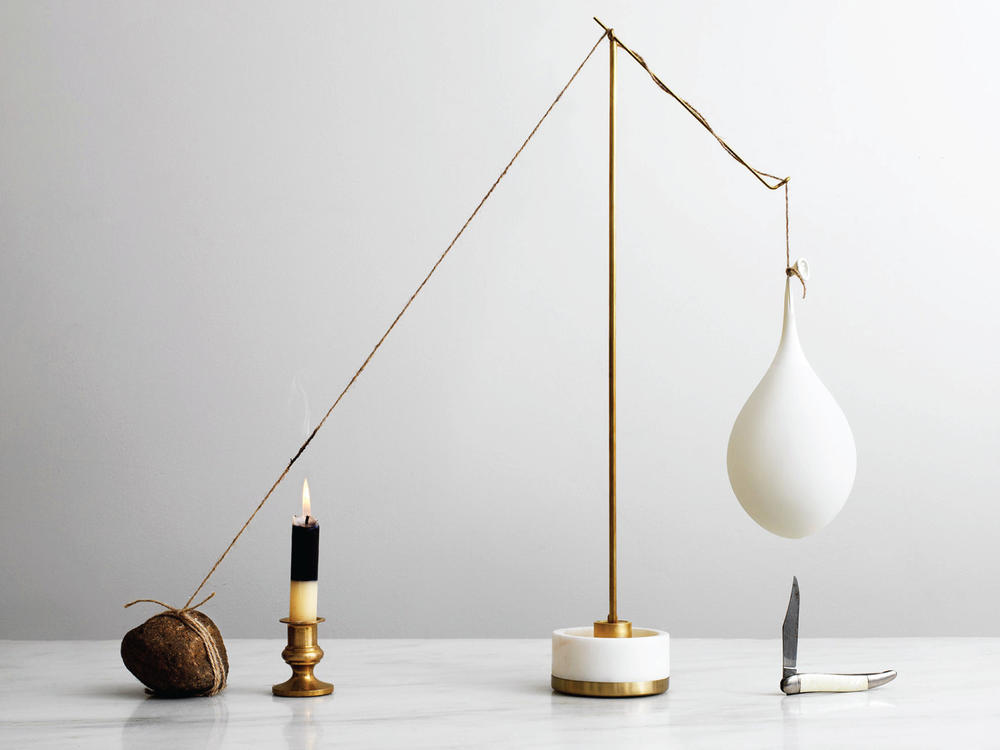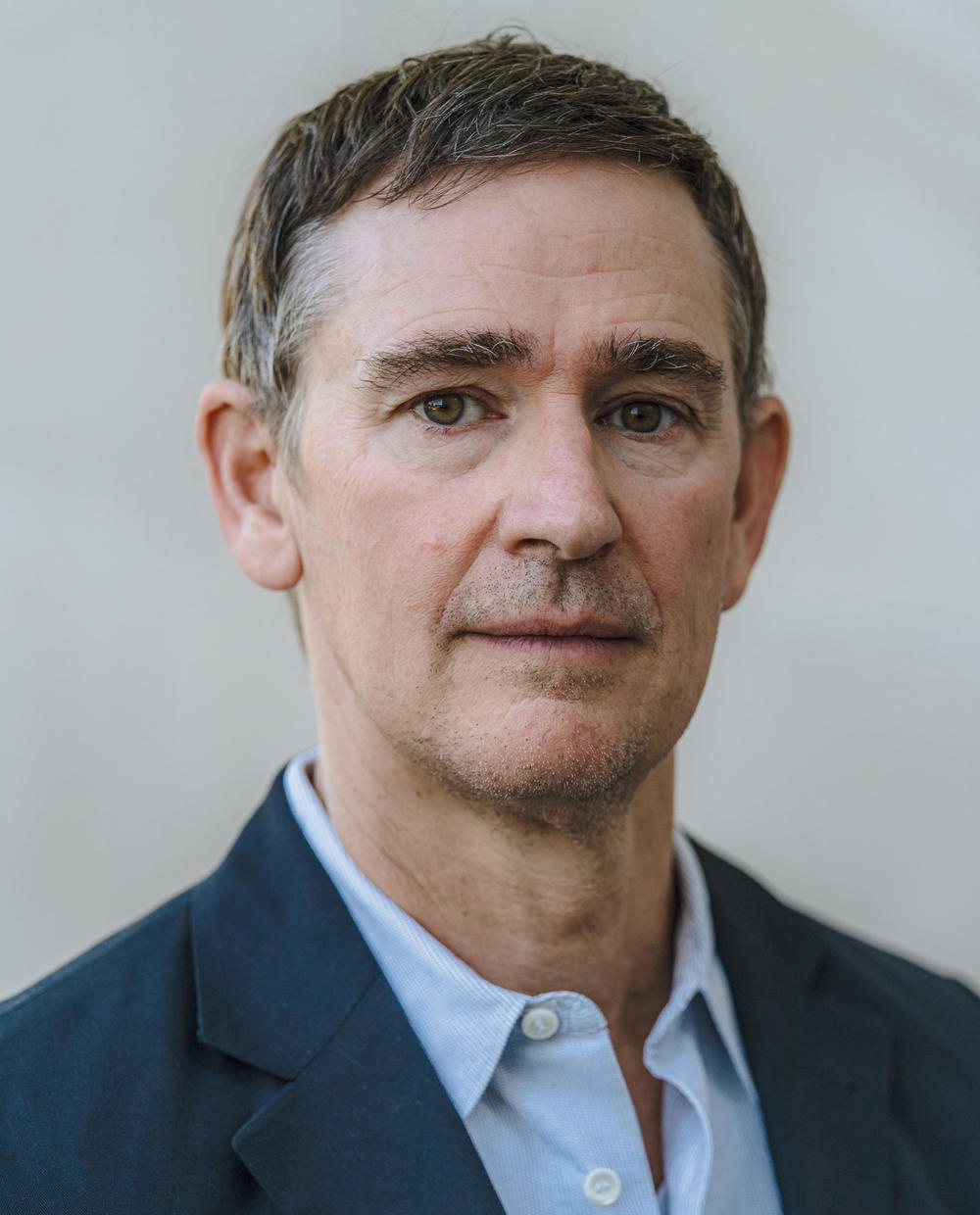Section Branding
Header Content
A survivor of multiple suicide attempts explains 'How Not to Kill Yourself'
Primary Content
Updated April 6, 2023 at 5:18 PM ET
If you or someone you know may be considering suicide or is in crisis, call or text 988 to reach the Suicide & Crisis Lifeline.
Clancy Martin has lived most of his life with two incompatible ideas in his head: "I wish I were dead – and I'm glad my suicides failed." Martin has survived more than 10 suicide attempts and he wrote his new memoir – How Not to Kill Yourself: A Portrait of the Suicidal Mind – especially for those who have attempted suicide, or struggle with suicidal thoughts.
"I am tremendously relieved that I did not die as a consequence of any of my suicide attempts," Martin says. "I'm so relieved that I am alive."
Martin says John Draper, who served as director of The National Suicide Prevention Lifeline, told him that anyone who survives a suicide attempt has a "superpower" — because they understand what it's like to be suffering in that way and are now in a position to help others going through something similar.
"So much of what drives the suicidal mind is the stigma of suicide, the shame of suicide, of having made an attempt of being afraid to reach out for help, of being afraid to talk to someone else," Martin explains. "And so the more we can talk about suicide openly, the more suicidal people we can help."
Martin is the author of over a dozen books on philosophy and has translated works by Nietzsche and Kierkegaard. He's a professor of philosophy at the University of Missouri in Kansas City and Ashoka University in New Delhi, India.
Interview Highlights
On asking his college students whether they've thought about suicide
I let them know that I have attempted suicide in the past and how I've dealt with my suicidal ideation so that they know that this is a safe, comfortable space. And then I say, 'OK, how many of you have thought about suicide?' And it's rare that 90% of the class doesn't raise their hands. ... I want them to know that now they're in a place where they can look around and see that they don't need to be afraid of this way of thinking. They don't need to be ashamed of it. They don't need to feel like there's something wrong with them, that this is an incredibly common and one might even say a normal way of thinking.
A philosopher friend of mine said ... "The best thing about your book is that you domesticated suicide." .... That this is no more a taboo subject than sex is a taboo subject or death is a taboo subject or grief is a taboo subject. All of these things, not only are we allowed to talk about them, but we need to talk about them because we're all feeling them. And once you lift that shame, you lift a lot of the burden of feeling that way.
You can also lift some of the appeal of the thought ... in a paradoxical fashion. When you stigmatize something, you give it a kind of allure. And when we remove the stigma, when you're in a room full of people and you realize, oh my gosh, all my friends, all these people around me, they also have thought about taking their own lives. Suddenly it's like, 'Oh, that's just something I'm thinking. It's not something I have to do. It's not something I have to act on and I don't have to feel bad about it.'
On his top piece of advice: Get rid of the gun
If you are a person who has ever felt the least bit suicidal – or if you are a person who has someone in their life who sometimes you think might suffer depression or might go through a suicidal period – I urge you, I cannot urge you more strongly, get rid of that gun. That's just the number one piece of advice I can give people.
On how he is liberating himself from suicidal thinking
I think I always had this very conflicted view of suicide. The desire to kill myself was extremely potent and also the feeling that this was absolutely the wrong thing to do in a moral way was also very potent. ... And so these beliefs were constantly at war with each other. And I think part of the story of how I am slowly trying to liberate myself from suicidal thinking is recognizing that those two ways of thinking were both mistaken and were kind of two sides of the same coin – that I needed to learn to accept my suicidal thinking, recognize that it was there, and not to add a moral label to it, not to be ashamed of it or afraid of it.
But even sort of when suicidal thoughts come up to sort of hold them like a little baby that needs attention and just say, 'OK, there you are, my suicidal thoughts and I'm going to take care of you. I'm not going to act on the basis of you, but I'm going to baby you a little bit until you go away as all thoughts — good and bad — eventually do.'
On existentialist philosophy and suicide
I think that this feeling that life didn't make sense and this was sort of a battle and a struggle and that it ought to make sense and that there are answers to these questions definitely drove me into philosophy. The philosophers I connect most deeply with, we call it the existentialist tradition. ...
Camus thought that you should not kill yourself out of stubbornness, that life is suffering and it is ultimately meaningless. And so you should say, you know what, life? I'm tougher than you are. I'm not going to let you do what I know you're trying to make me do, which is to end my life, I'm going to stand up to you. And he thought that in standing up to life, as he put it, as with Sisyphus rolling that rock back up the hill, that's where you find your meaning. And that's the opportunity for beginning to make sense of life and to turn life into something that you're grateful for. When you say, you know what? Even with all the suffering, I'm going to stick around.
On the Tibetan prayer "May we be happy without hope"
I think it's so important that we stop thinking in kind of a bivalent way, especially if you're the sort of person who suffers from suicidal ideation. You're sort of thinking like right and wrong, black and white, disaster or complete relief from disaster, fight or flight. You have to start thinking in a less aggressive way ... and start accepting a little bit more. Once you start accepting a little bit more than you might realize, the future is not really in my control at all and the past is already behind me. And so hope, hopelessness, these ways of thinking aren't really helpful to you. You just kind of let go of all that a little bit and be a bit gentler with your belief system and be a little bit gentler with your thoughts.
On taking care of yourself, above all
If you're someone who struggles with the thought of suicide, you have to take seriously that you have this opportunity to care for yourself and care for yourself. Even if you feel like I'm not someone who's worth caring for – care for yourself – so that you have the ability to care for the people who need you. Trust me, you are surrounded by people who need you and who want you to live. You might not feel that way, but it is true. And use that if you can't use anything else as an excuse to take care of yourself.
On calling or texting the mental health/suicide hotline 988
The "988" really is good, and calling 988, or texting 988, they've gotten very, very good at helping people. ... That's the mental health crisis hotline, just text them and say 'I'm feeling like hurting myself' or 'I'm feeling really low' ... or call and they will get back to you very quickly and they are good.
Copyright 2023 Fresh Air. To see more, visit Fresh Air.


